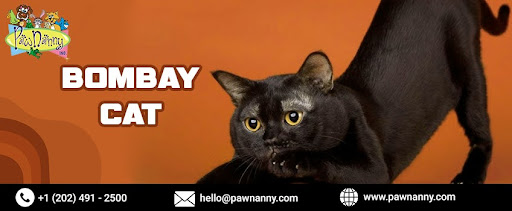
Bombay
Size: 11-14 inches
Weight: 6-10 pounds
Hypoallergenic: No
Lifespan: 12-16 years
Behavior
The Bombay cat is known for its affectionate and social nature even during pet house sitting services, making it a wonderful companion and a delightful addition to any household. Their behavior can be described as friendly, outgoing, and people-oriented. Bombay cats thrive on human interaction and love being the center of attention. They form strong bonds with their human family members and enjoy being involved in their daily activities. They are often described as affectionate and cuddly cats, often seeking out laps or cozy spots to curl up with their owners.
In addition to their affectionate nature, Bombay cats are known for their playful and energetic behavior. They enjoy interactive play sessions, chasing toys, and engaging in games that challenge their agility and intelligence, and are best customers for overnight pet sitting services.
The Bombay cat as a pet needs love, attention, proper nutrition, exercise, grooming, and regular veterinary care for a healthy and fulfilling life. Their playful demeanor makes them excellent companions for families with children or other pets. While they are people-oriented, Bombay cats are also generally sociable with other animals, including dogs or other cats. Their friendly nature and adaptability make them a great fit for multi-pet households. Despite their playful side, Bombay cats also appreciate quiet time and enjoy moments of relaxation. They are generally not overly demanding and can be independent to some extent.
Hence, the Bombay cat's behavior is characterized by their affectionate nature, playful demeanor, and social adaptability. Their ability to form strong bonds with their human companions, along with their friendly and sociable attitude, make them a cherished and lovable feline companion for individuals or families seeking a devoted and engaging pet.
History
The Bombay cat is a breed that was developed in the United States in the 1950s. The breed's development began when a breeder named Nikki Horner set out to create a cat that resembled the black leopard of India. She crossed a sable Burmese with a black American Shorthair, aiming to capture the Burmese's affectionate nature and the American Shorthair's muscular body and black coat. After several generations of selective breeding, Horner successfully created the Bombay breed with its distinctive black coat, medium-sized body, and copper or gold-colored eyes. The breed was named after the Indian city of Bombay, now known as Mumbai, due to its resemblance to the black leopards found in India.
The Bombay cat was officially recognized by cat registries in the 1970s, and since then, it has gained popularity worldwide for its striking appearance and friendly temperament. Today, the Bombay cat is recognized by major cat associations, including the Cat Fanciers' Association (CFA) and The International Cat Association (TICA). The breed's distinct and exotic look, combined with its loving and outgoing personality, has made the Bombay cat a cherished companion for cat enthusiasts around the globe. Its rich history as a breed developed through careful breeding and dedication has established the Bombay cat as a unique and beloved feline breed.
Looks & Health
The Bombay cat is known for its striking and sleek appearance. One of its most distinctive features is its deep, lustrous black coat, which is short, dense, and glossy. The black color is uniform and extends to the roots, giving the cat a panther-like appearance. In addition to their black coat, Bombay cats have a muscular and medium-sized body. They have a well-proportioned physique with a sturdy frame, giving them a sense of strength and agility. Their head is rounded, with a short muzzle and expressive, wide-set eyes. The eye color is typically copper or gold, which beautifully contrasts against the black fur, adding to their captivating and enchanting look. Bombay cats have medium-sized ears that are set wide apart, completing their elegant and balanced facial features.
The Bombay cat is generally a healthy breed with no specific health issues associated exclusively with the breed. However, like all cats, they can be prone to certain common feline health conditions. Regular veterinary check-ups, vaccinations, parasite control, and dental care are essential aspects of their healthcare routine. Feeding them a balanced and high-quality diet specifically formulated for adult cats helps support their immune system, maintain a healthy weight, and prevent common feline health issues. Bombay cats are generally active and playful, so providing opportunities for regular exercise and mental stimulation is important to prevent obesity and promote their overall fitness. Grooming, including brushing their coat and cleaning their ears and teeth, helps prevent potential hygiene-related issues.
Food & Nutrition
Provide your Bombay cat with high-quality commercial cat food that is specifically formulated for adult cats. Look for a brand that lists a quality source of animal protein, such as chicken or fish, as the primary ingredient. Avoid foods that contain excessive fillers, artificial additives, or by-products. A balanced diet for a Bombay cat includes a proper balance of protein, fats, carbohydrates, vitamins, and minerals. The cat food should meet the nutritional guidelines set by reputable organizations like the Association of American Feed Control Officials (AAFCO).
Portion control is essential to prevent obesity, which can be a concern for Bombay cats. Follow the feeding guidelines provided on the cat food packaging and adjust the amount based on your cat's age, weight, activity level, and overall condition. Regularly monitor your Bombay cat's weight and consult with a veterinarian if adjustments are needed. Fresh water should always be available for your Bombay cat. Ensure that the water bowl is clean and refill it regularly to provide your cat with clean and fresh water. While a balanced commercial diet is typically recommended, some owners may choose to supplement their Bombay cat's diet with small amounts of cooked, boneless meat or fish as a treat. However, it is important to consult with a veterinarian before introducing any new foods to ensure they are safe and appropriate for your cat's specific needs.
Conclusion
The Bombay cat makes an exceptional pet and is cherished by many for its wonderful qualities as a companion. As a pet, the Bombay cat is known for its loving, affectionate, and social nature. Bombay cats form strong bonds with their human family members and enjoy being involved in their daily activities. They are often described as cuddly and enjoy snuggling up with their owners. Their affectionate nature brings joy and comfort to their human companions. Not only are Bombay cats loving, but they are also playful and energetic.
The Bombay cat needs love, attention, regular veterinary care, a balanced diet, exercise, interactive playtime, a clean environment, and a safe and comfortable space to sleep and relax. They enjoy interactive play sessions and engaging in games that challenge their agility and intelligence. Their playful nature makes them entertaining and fun to have around.
Bombay cats are generally sociable with other animals, including dogs and other cats, making them a great fit for multi-pet households. Their friendly and adaptable temperament allows for easy integration into various living environments. Additionally, Bombay cats have a sleek and striking appearance, resembling mini panthers, which adds to their charm as pets. The Bombay cat's affectionate personality, playful nature, and adaptability make it a beloved and cherished pet. Whether you're seeking a cuddly companion or a playful friend, the Bombay cat is sure to bring happiness, love, and a delightful presence to your home. For more information or to avail our pet house sitting services in Fairfax VA, visit Pawnanny.com .










